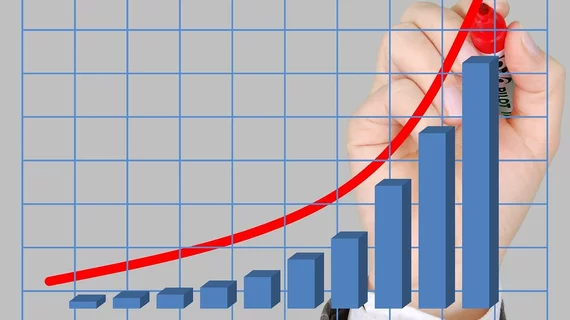Private equity-backed Solis Mammography saw earnings jump 25% last year, up to $54M
Solis Mammography saw its earnings (before interest, taxes, depreciation and amortization) jump 25% in 2022, up to $54 million. But the private equity-backed imaging player still faces ongoing risk, given its debt-supported growth strategy, Fitch Ratings said Friday.
Based in Addison, Texas, Solis is the largest independent provider of mammograms in the U.S. with 100 centers specializing in 3D breast imaging. The company is “distinguished” by a largely female staff at its centers and breast-dedicated subspecialty radiologist partners, Fitch noted.
Solis Mammography benefits from the “modest but stable” pricing of its exams, “robust” insurance coverage and a “clear value proposition.” However, the company’s growth plans may pose challenges in the future, experts noted.
“[Private equity]-backed expansion strategies invariably entail execution and integration risks, and Solis is clearly pursuing aggressive expansion, investing about $250 million to add about 50 centers since 2016 through year-end 2022,” analyst Patrick Finnegan and colleagues wrote Oct. 13.
The company’s saw its debts climb to 16.7 times adjusted earnings at the end of 2020. But the number fell to 11x in 2021, and 8.7x by the end of last year. Fitch expects Solis Mammography’s obligations to remain around 7 times its adjusted earnings this year, but volume growth, rate increases and new investments should fuel 15% compound annual growth rate in earnings into 2026.
About 70% of the company’s centers are operated through joint ventures with large hospital systems. And Solis may lack diversification, “given its narrow focus on breast imaging, potentially increasing the volatility of its financial results.” About half of joint venture revenues come through a partnership with for-profit industry giant HCA Healthcare, the nation’s largest hospital system.
“Fitch views favorably the business and financial aspects of the JVs, especially with hospital systems focused on capturing demand shifting to outpatient settings,” the analysis noted. “The JV model aligns hospital systems and Solis’ interests and generates growth opportunities for Solis as its partners expand in existing markets and new markets alike. While the company's JV structure should help spread the risk of expansion investments, it adversely adds accounting complexity, obscures peer comparison, and reduces the predictability of recovery in default.”
Fitch assigned a “B-” long-term issuer rating to SM Wellness Holdings and its subsidiaries, WDT Acquisition Corp. and WRA Management, collectively doing business as Solis Mammography. This indicates that “material credit risk is present,” according to the ratings agency. Meanwhile, its term loans coming due in 2028 were tagged with a “CCC” rating, denoting “substantial credit risk,” with low margin for safety and default a “real possibility.”
“While Fitch recognizes Solis’ leading position in mammography and imaging services and its favorable position in partnering with leading hospital systems in attractive urban markets, the 'B-' [long-term issuer default rating] also reflects risk factors including exposure to its largest hospital system JV partner (HCA), a narrow business focus, significant geographic concentration, and Fitch’s expectation that Solis is likely to sustain elevated leverage while transitioning to positive [free cash flow] amid its ongoing expansion,” the analysis noted.
Radiology Business has reached out to Solis Mammography for comment on the ratings action and will update this story with their response.

